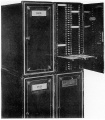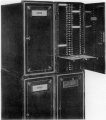File:Harvard collection.jpg: Difference between revisions
| (2 intermediate revisions by the same user not shown) | |||
| Line 2: | Line 2: | ||
These considerations have led us to adopt a metal cabinet, which has been specially devised for our needs. It is made of sheet tin in such a manner that the trays are very compact, are absolutely interchangeable, an intake up a minimum amount of room. The construction adopted is such that the tendency to warp is entirely done away with (Fig.3) The trays are all japanned so that they do not rust, and we slip a bit of white paper into each tray to make a background for the sections. Each tray is, moreover, furnished with a litle label holder, and they are put together in cabinets of thirty trays each, the trays themselves being of such a size that they will hold twenty-four of the ordinary slides, three inches by one. Moreover, the cabinets themselves are so devised that they can be stacked one on top of another, taking up a minimum amount of room. We devote a vertical column of these cabinets to a species, and simply interpolate from time to time a new cabinet in the column as the growth of the col- lection may render necessary. The cabinets are made by Peter Gray & Co., of Union street, Boston, and are now kept in stock by several of the dealers in microscopical supplies in this country. They cost only a trifle more than the wooden cabinets, and are, according to our trial of them, certainly to be preferred to any other form of cabinet which we have tested. | These considerations have led us to adopt a metal cabinet, which has been specially devised for our needs. | ||
It is made of sheet tin in such a manner that the trays are very compact, are absolutely interchangeable, an intake up a minimum amount of room. The construction adopted is such that the tendency to warp is entirely done away with ([[:File:Harvard_collection.jpg|Fig. 3]]) The trays are all japanned so that they do not rust, and we slip a bit of white paper into each tray to make a background for the sections. Each tray is, moreover, furnished with a litle label holder, and they are put together in cabinets of thirty trays each, the trays themselves being of such a size that they will hold twenty-four of the ordinary slides, three inches by one. Moreover, the cabinets themselves are so devised that they can be stacked one on top of another, taking up a minimum amount of room. We devote a vertical column of these cabinets to a species, and simply interpolate from time to time a new cabinet in the column as the growth of the col- lection may render necessary. | |||
The cabinets are made by Peter Gray & Co., of Union street, Boston, and are now kept in stock by several of the dealers in microscopical supplies in this country. They cost only a trifle more than the wooden cabinets, and are, according to our trial of them, certainly to be preferred to any other form of cabinet which we have tested. | |||
:[[Paper_-_The_Harvard_Embryological_Collection|Harvard Links]]: [[:File:Harvard_collection1905 fig1.jpg|Fig. 1. Embryo Storage]] | [[:File:Harvard_collection1905 fig2.jpg|Fig. 2. Slides]] | [[:File:Harvard_collection.jpg|Fig. 3. Slide Cabinet]] |[[Paper_-_The_Harvard_Embryological_Collection|1905 The Harvard Embryological Collection]] | [[Embryology History - Charles Minot|Charles Minot]] | [[Harvard Collection]] | :[[Paper_-_The_Harvard_Embryological_Collection|Harvard Links]]: [[:File:Harvard_collection1905 fig1.jpg|Fig. 1. Embryo Storage]] | [[:File:Harvard_collection1905 fig2.jpg|Fig. 2. Slides]] | [[:File:Harvard_collection.jpg|Fig. 3. Slide Cabinet]] |[[Paper_-_The_Harvard_Embryological_Collection|1905 The Harvard Embryological Collection]] | [[Embryology History - Charles Minot|Charles Minot]] | [[Harvard Collection]] | ||
{{Historic Disclaimer}} | {{Historic Disclaimer}} | ||
[[Category:Charles Minot]] | ===Reference=== | ||
{{Ref-Minot1905}} | |||
{{Footer}} | |||
[[Category:Charles Minot]][[Category:Harvard Collection]] | |||
Latest revision as of 07:27, 29 April 2017
Harvard Collection Cabinet
These considerations have led us to adopt a metal cabinet, which has been specially devised for our needs.
It is made of sheet tin in such a manner that the trays are very compact, are absolutely interchangeable, an intake up a minimum amount of room. The construction adopted is such that the tendency to warp is entirely done away with (Fig. 3) The trays are all japanned so that they do not rust, and we slip a bit of white paper into each tray to make a background for the sections. Each tray is, moreover, furnished with a litle label holder, and they are put together in cabinets of thirty trays each, the trays themselves being of such a size that they will hold twenty-four of the ordinary slides, three inches by one. Moreover, the cabinets themselves are so devised that they can be stacked one on top of another, taking up a minimum amount of room. We devote a vertical column of these cabinets to a species, and simply interpolate from time to time a new cabinet in the column as the growth of the col- lection may render necessary.
The cabinets are made by Peter Gray & Co., of Union street, Boston, and are now kept in stock by several of the dealers in microscopical supplies in this country. They cost only a trifle more than the wooden cabinets, and are, according to our trial of them, certainly to be preferred to any other form of cabinet which we have tested.
- Harvard Links: Fig. 1. Embryo Storage | Fig. 2. Slides | Fig. 3. Slide Cabinet |1905 The Harvard Embryological Collection | Charles Minot | Harvard Collection
| Historic Disclaimer - information about historic embryology pages |
|---|
| Pages where the terms "Historic" (textbooks, papers, people, recommendations) appear on this site, and sections within pages where this disclaimer appears, indicate that the content and scientific understanding are specific to the time of publication. This means that while some scientific descriptions are still accurate, the terminology and interpretation of the developmental mechanisms reflect the understanding at the time of original publication and those of the preceding periods, these terms, interpretations and recommendations may not reflect our current scientific understanding. (More? Embryology History | Historic Embryology Papers) |
Reference
Minot CS. The Harvard embryological collection. (1905) J Med Res. Aug;13(5):499-522.PMID 19971684 | PDF
Cite this page: Hill, M.A. (2024, May 4) Embryology Harvard collection.jpg. Retrieved from https://embryology.med.unsw.edu.au/embryology/index.php/File:Harvard_collection.jpg
- © Dr Mark Hill 2024, UNSW Embryology ISBN: 978 0 7334 2609 4 - UNSW CRICOS Provider Code No. 00098G
File history
Click on a date/time to view the file as it appeared at that time.
| Date/Time | Thumbnail | Dimensions | User | Comment | |
|---|---|---|---|---|---|
| current | 20:01, 1 April 2014 |  | 874 × 1,000 (222 KB) | Z8600021 (talk | contribs) | |
| 20:00, 1 April 2014 |  | 706 × 800 (89 KB) | Z8600021 (talk | contribs) | ==Harvard Collection== Category:Charles Minot |
You cannot overwrite this file.
File usage
The following 4 pages use this file:
